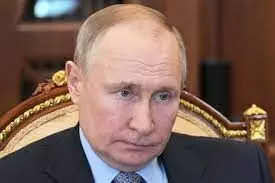
Disagreement among EU leaders on how to deal with Russia were on display on Thursday as they headed into talks in Brussels. The talks are also to address their testy relations with Turkey. The strained ties with the bloc’s eastern neighbour are one of the most daunting challenges the 27 leaders are to tackle during […]

Disagreement among EU leaders on how to deal with Russia were on display on Thursday as they headed into talks in Brussels.
The talks are also to address their testy relations with Turkey.
The strained ties with the bloc’s eastern neighbour are one of the most daunting challenges the 27 leaders are to tackle during their two-day meeting.
EU Foreign Fffairs Chief, Josep Borrell, warned last week that relations were on a path of further deterioration.
But the bloc is split about how to approach Moscow.
While France and Germany are keen to push relations with Moscow into a more positive direction, a Franco-German proposal to hold an EU-Russia summit talks is unpopular with several other member states.
German Chancellor Angela Merkel said the European Union should find ways to enter into direct dialogue with Russia, arguing that “conflicts can best be solved … if you also talk to each other’’.
French President Emmanuel Macron noted that U.S. President Joe Biden had met Putin – even though they were geographically farther apart than Russia and the EU.
Other countries, however, are sceptical of the approach and urged caution.
“We don’t see any radical change in the pattern of behaviour of Russia,’’ Lithuanian President Gitanas Nauseda said.
“If without any positive changes in the behaviour of Russia, we will start to engage, it will send very uncertain and bad signals to our partners, for example Eastern partnership countries.’’
“It seems to me like we try to engage the bear to keep a part of honey safe,’’ he added.
Dutch Prime Minister Mark Rutte said that while he was not in principle against directly engaging with Russia, he would not attend such a meeting.
Among the loudest support for direct dialogue with Putin came from Austrian Chancellor Sebastian Kurz, who said it was high time for such a meeting.
At the summit the EU partners will have to attempt to strike a balance.
According to a draft statement seen by dpa that EU leaders could approve on Thursday, the 27 heads of state and governments could call on the European Commission and Borrell “to present options for additional restrictive measures, including economic sanctions’’.
The EU has already slapped sanctions on Russia in several rounds, including for the annexation of Crimea and the poisoning of Kremlin critic Alexei Navalny.
While threatening economic sanctions, the leaders would also reiterate the European Union’s openness to a selective engagement with Russia on the EU’s interests, if they agree on the draft statement.
The other major – but less controversial – concern for the leaders are EU-Turkey relations.
After a rocky patch, dealings with Ankara stabilised enough for the bloc to dangle the prospect of fresh cash for refugee-hosting and modernisation of the Turkey-EU customs union in March.
The hope is that the de-escalation continues, an EU official said ahead of the summit.
The participants are also expected to raise concerns with Hungarian Prime Minister, Viktor Orban, about a new law that restricts youth access to content portraying lesbian, gay, bisexual and transgender issues.
Now facing the threat of EU legal action, Orban denies that the bill is discriminatory.
“In the communist regime, homosexuality was punished and I fought for their freedom and their rights,’’ the conservative politician said on his way into a summit.
“I am defending the rights of the homosexual guys.’’
Migration, with a focus on cooperation with third countries, is also on the agenda as is the bloc’s pandemic response and recovery.




